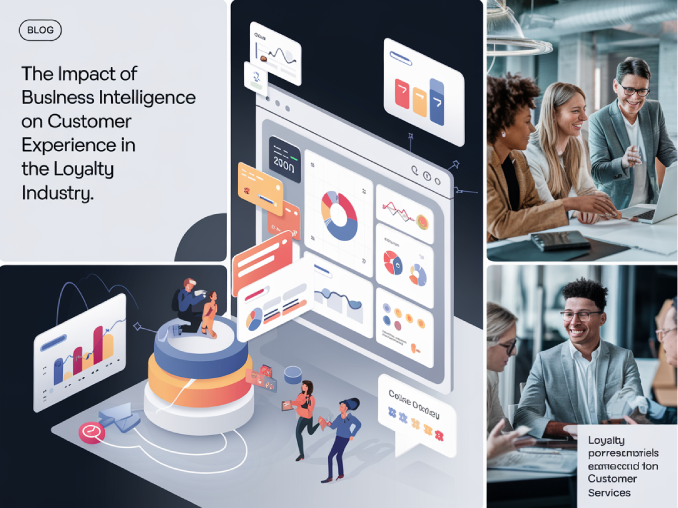
In today's hyper-competitive market, the loyalty industry is increasingly turning to Business Intelligence (BI) to craft exceptional customer experiences that not only retain customers but also convert their loyalty into a competitive advantage. This transformation is fueled by the insights derived from advanced analytics, enabling businesses to personalize interactions and predict future behaviors. Here’s how BI is reshaping customer experience in the loyalty industry.
Understanding Customer Behavior through Data
Business Intelligence tools are pivotal in dissecting vast amounts of customer data to reveal patterns, trends, and insights. By analyzing transaction histories, engagement data, and customer feedback, companies can create detailed customer profiles. These profiles inform targeted marketing strategies that resonate on a personal level, enhancing customer satisfaction and loyalty. For instance, a BI system can help identify the most preferred products among various demographics, allowing companies to tailor their promotions and rewards accordingly.
Enhancing Personalization and Engagement
The capability of BI to segment customers into distinct groups based on behavior and preferences is particularly transformative. This segmentation enables companies to engage customers with personalized messages and offers that are relevant to their specific needs and likely to elicit a positive response. For example, predictive analytics can be used to determine the optimal time to reach out to customers with special offers or to remind them of unused loyalty points. This proactive engagement helps in cementing a positive customer experience and builds a foundation for lasting loyalty.
Optimizing Customer Journeys
BI tools empower companies to map and optimize the customer journey comprehensively. By analyzing customer interactions across touchpoints, companies can identify friction areas that detract from the customer experience. Whether it’s a cumbersome redemption process or a poorly timed communication, BI provides the insights needed to streamline operations and ensure a seamless customer journey. Moreover, improvements based on BI analytics directly correlate with higher customer satisfaction and retention rates.
Predictive Analytics in Preventing Churn
Business intelligence goes beyond reactive strategies by incorporating predictive models that forecast future customer behaviors, including churn. By understanding the signs that a customer is likely to disengage, companies can implement targeted retention strategies to re-engage them before they leave. This might include special offers, personalized recommendations, or even direct outreach to understand their concerns better. Predictive analytics thus serves as an early warning system, allowing loyalty programs to remain one step ahead of potential customer dissatisfaction.
Real-Time Feedback for Immediate Improvement
One of the more innovative applications of BI in customer experience is the integration of real-time feedback systems. These systems allow companies to capture and analyze customer feedback immediately after an interaction or transaction occurs. This real-time data stream enables businesses to quickly identify and address issues, often before the customer has a chance to become truly dissatisfied. Moreover, immediate adjustments can be made to operations, ensuring that the customer experience is consistently refined and improved based on actual customer inputs.
Challenges and Considerations
While the benefits of BI in enhancing customer experience are clear, there are challenges as well. The complexity of managing and analyzing vast datasets can be daunting without the proper tools and expertise. Additionally, as companies become more reliant on digital channels facilitated by BI, the human element of customer service must not be overlooked. Personal touches and human interactions remain crucial in resolving complex customer issues and fostering emotional connections with the brand.
Real-Time Updates and Maintenance
The cloud enables software providers to roll out updates and patches in real time, which significantly enhances the user experience by ensuring that software functionalities are up-to-date and that security vulnerabilities are addressed promptly. Users benefit from the latest features without any action required on their part and with minimal disruption to service.
Furthermore, privacy concerns are increasingly at the forefront of customers' minds. Companies must navigate the delicate balance between personalization and privacy, ensuring that customer data is used ethically and transparently. Customers are more likely to trust and stay loyal to brands that respect their privacy and use their data responsibly.
Conclusion
The strategic application of Business Intelligence in the loyalty industry is not just enhancing customer experiences—it's redefining them. By leveraging data to understand, predict, and respond to customer needs, companies are not only meeting but exceeding customer expectations. The future of customer loyalty lies in the intelligent use of data to foster genuine, rewarding relationships with customers, ensuring their preferences and needs are met with unmatched precision and care. As BI tools and technologies continue to evolve, so will the capabilities of loyalty programs to captivate and retain customers.
of our story
hr@annexcloud.com
















